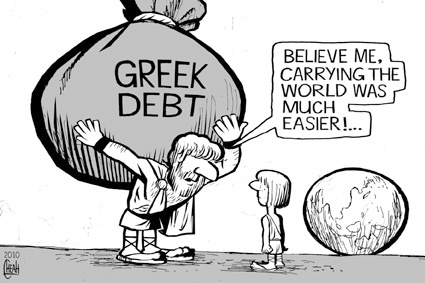Kenneth Rogoff writes: The International Monetary Fund’s acknowledgement that Greece’s debt is unsustainable could prove to be a watershed moment for the global financial system. Clearly, heterodox policies to deal with high debt burdens need to be taken more seriously, even in some advanced countries.
Ever since the onset of the Greek crisis, there have been basically three schools of thought. First, there is the view of the so-called troika (the European Commission, the European Central Bank, and the IMF), which holds that the eurozone’s debt-distressed periphery (Greece, Ireland, Portugal, and Spain) requires strong policy discipline to prevent a short-term liquidity crisis from morphing into a long-term insolvency problem.
The orthodox policy prescription was to extend conventional bridge loans to these countries, thereby giving them time to fix their budget problems and undertake structural reforms aimed at enhancing their long-term growth potential.
A second school of thought also portrays the crisis as a pure liquidity problem, but views long-term insolvency as an outside risk at worst.
A third point of view is that, given the massive financial crisis, Europe’s debt problem should have been diagnosed as an insolvency problem from the start, and treated with debt restructuring and forgiveness.
Europe’s experience ought to spur a full rethink of the global system for administering sovereign bankruptcies. That could mean bringing back older IMF proposals for a sovereign bankruptcy mechanism, or finding ways to institutionalize the Fund’s recent stance on Greek debt. There is no free lunch in Europe, and there never was; but there are much better ways to deal with unsustainable debt. Greece’s Debt Solution

